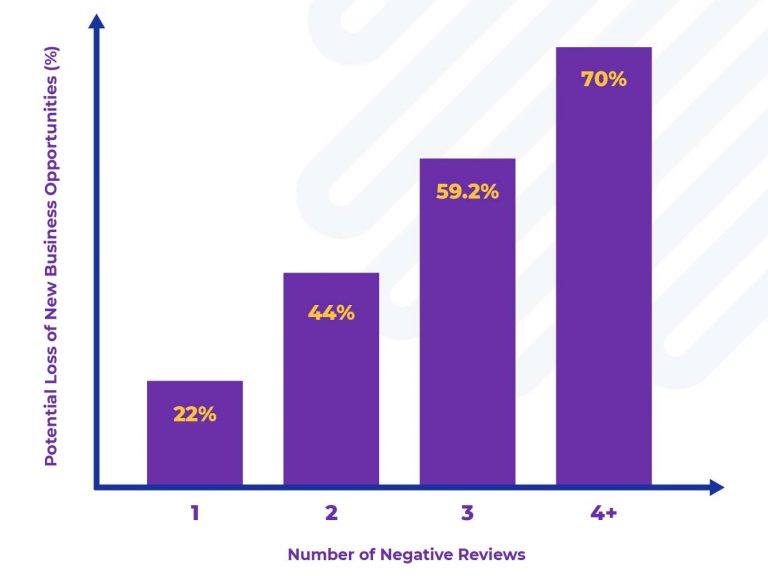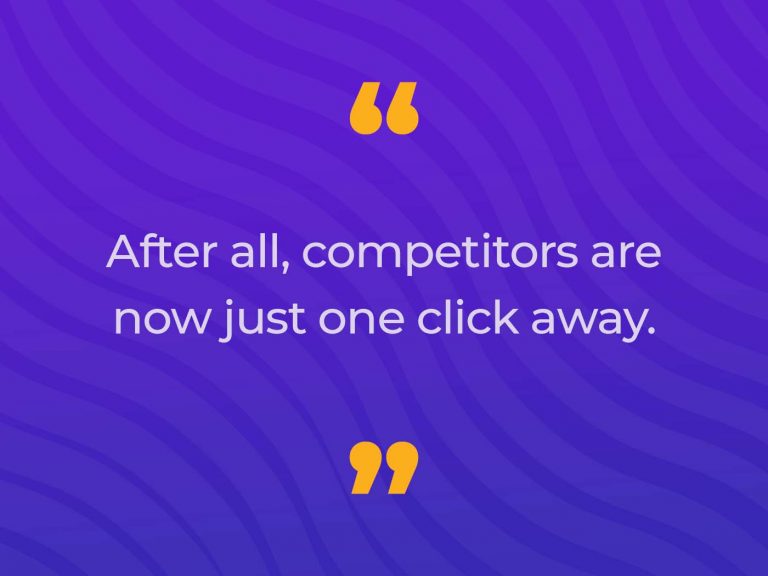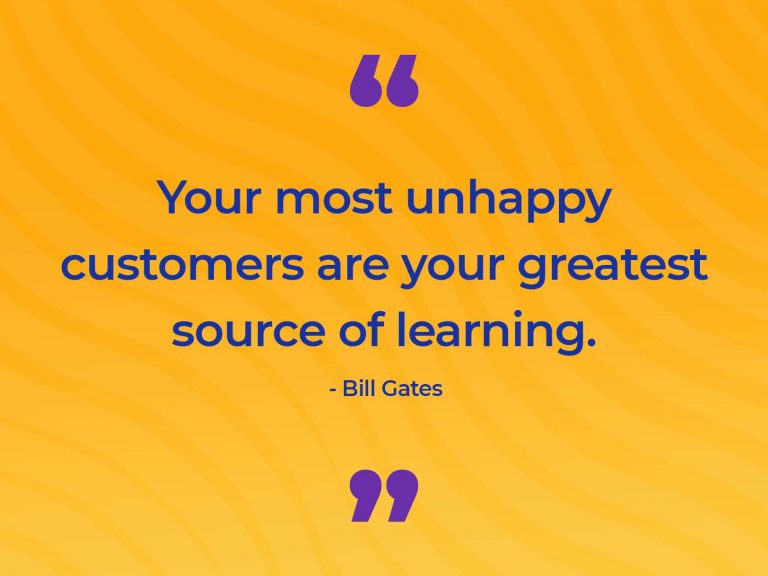“The secret to marketing success is no secret at all — word-of-mouth is all that matters.” – Seth Godin, Author and Former Dot-Com Business Executive.
Words can spread like wildfire within a community, especially when it comes to customer experience. This is exactly why word-of-mouth is so powerful. On average, word-of-mouth drives $6 trillion in annual global spending and is responsible for 13% of all sales.
In response to this, 70% of marketers are looking to increase their online word-of-mouth spending, directly influencing their overall marketing strategy. Customer service is one of the most critical areas to address. If improved customer service and a word-of-mouth strategy aren’t a priority within your company, you risk being left behind, especially if your major competitors are among that 70%.
Invest in the power of word-of-mouth and revenue will follow.
What is Word-of-Mouth and Why Does it Matter?
Small businesses are the backbone of the American economy.
Whether you operate a small law firm in New York City, own a real estate company in Birmingham, or provide home services to the residents of San Francisco, your business brings growth to your community — and this is no small feat.
As a small business owner, you know how tough it is to start and then successfully grow a business. It takes a lot of time, effort, and planning. There always seems to be a never-ending task list. In addition to marketing, accounting, sales, and every other aspect of your business, you need to make sure your customers are happy. Even one negative experience can tarnish your reputation, especially in a small, tight-knit community.
This brings us to word-of-mouth, one of the most influential variables going on behind the scenes every day.
“Word-of-mouth” is the process of telling others about a particular product or service, as well as their experiences with those products or services — or the company that offers them. Considering people are 90% more likely to trust and buy from a brand recommended by a friend, investing in customer service to improve the word-of-mouth spread about your business is a highly effective approach.
Traditionally, word-of-mouth was spread from one person to the next based on recommendations. This is still the case. However, with the acceleration of technology word-of-mouth is now spread digitally. People are talking about their experiences with businesses across numerous online platforms. The chances of your business being talked about is now multiplied.
This means that word-of-mouth can happen in one of two ways — organically or through digital conversations and reviews.
Here are just some reasons you need to consider word-of-mouth within your overall business plan.
- 28% of consumers say word-of-mouth is the most important factor in strengthening or eroding brand affinity.
- 64% of executives believe word-of-mouth is the most effective form of marketing.
- Offline word-of-mouth accounts for two-thirds of sales and online word-of-mouth accounts for one-third.
The Impact Word-of-Mouth Has on Revenue
What people say about your business will directly influence your revenue — and this could go either way.
When you offer impeccable customer service and your customers leave happy, you create a cycle that drives higher sales and sustained growth. However, when your customers leave unhappy, the opposite effect may result. This can create a vicious cycle of losing business, which will affect your bottom line.
Research shows that when potential customers find one negative article on the first page of their search results, businesses risk losing 22% of new business opportunities. This figure grows with the number of negative mentions. With two negatives on the first page, you risk losing 44% of your customers; three negatives lead to a potential loss of 59.2% of your customers; and if there are four or more negative articles in Google search results, you could lose 70% of your potential customers.
By investing in word-of-mouth and optimal customer service, you can grow sales without spending your budget on ads. You will also achieve healthier profits based on the customer loyalty. After all, it can cost five time more to acquire a new customer than to keep a current one. If you’re retaining customers, and those customers are spreading positive recommendations, you can significantly boost your company’s profitability.
How to Grow Small Business Through Word-of-Mouth
Without customers, you can’t achieve any growth.
Since word-of-mouth is so influential throughout the consumer journey, it can have a significant effect on how quickly you grow and, more importantly, sustain that growth — especially among small businesses. After all, 85% of small businesses get customers through word-of-mouth.
Small businesses often rely on the support of those in their local community while achieving growth online. As you may have experienced, your reliance on local customers heightens the influence of word-of-mouth. When word-of-mouth around your local area is bad, it can destroy your business. In contrast, when word-of-mouth is good, you can achieve local domination.
Leverage word-of-mouth as a cost-effective and powerful form of advertising. This tactic will also help you build a solid reputation.
Yes, there are many forms of marketing and advertising, and each offers unique advantages. However, the rise of unreliable, skewed reviews combined with increased consumer awareness means that word-of-mouth remains one of the most successful ways of advertising. This includes the things people are saying online and offline.
For example, if you’re in the construction business, operating as a builder, it’s not uncommon for people to come to you because of a friend or family member’s house you built. People who are happy with the service they received throughout your working relationship will make all the difference. Even if you built a beautiful home, some clients may not recommend you if you lacked communication through the building process.
Related: Reasons You Get Repeat Callers
In today’s fast-paced digital world, it’s easy to be replaced. Negative word-of-mouth can make current customers jump ship and prospective customers take their business elsewhere. After all, competitors are now just one click away.
That is why you should make it easy for customers to share word-of-mouth. Develop initiatives to get your happy customers talking.
Here are some tactics:
- The most obvious and easiest approach is to provide the best possible customer service. Treat each customer with respect, ensuring their needs are met. When you provide exceptional customer service, your job is done. Your customers will do the rest, telling others about your level of professionalism.
- Customers are often willing to offer referrals, but people are busy! Send a follow-up email that thanks them, asking them to refer others who need the products or services you provide. You could also provide easy ways to leave a quick testimonial on Facebook, Google+, or any other page that’s relevant to your company.
- Offer a “refer a friend” incentive, such as $50 off the next service you provide.
The Link Between Customer Service and Word-of-Mouth
Both good and bad customer service have a direct and significant influence on brand loyalty.
Word-of-mouth is triggered when a customer experiences something beyond what they expected. Although you may not be thinking of gifts or promotional incentives, this is necessary. The key is to please your customers throughout their entire experience, focusing on how you treat and communicate with them. Remember, these are the people who are going to drive the growth of your business.
When you invest in exceptional customer experiences, this will foster positive word-of-mouth, helping you reduce costs and increase conversions.
In contrast, poor customer service can lead to negative word-of-mouth. People talk about their experiences with companies — especially when those experiences were less than great. Research shows that 54% of people who shared a bad experience did so more than five times, compared to 33% of those who shared a good experience. The same survey found that, overall, 95% of people who have a bad experience tell someone about it, compared to 87% who share a good experience.
The following stats show how important quality customer service is.
- 58% of American Consumers will switch companies because of bad customer service.
- 93% of customers are likely to make repeat purchases with companies that offer excellent customer service.
- 36% of consumers will share their customer service experience, whether it’s bad or good.
- 95% of American customers will recommend a company whose service they rate as “very good.”
Recommended reading: Improve Customer Service with a Call Answering Service
3 Customer Service Tips to Consider for Your Small Business
Regardless of your size or industry, customer service is imperative to your success. It’s also one way you can compete with larger businesses.
Show your customers how important they are to you, and that you care about their needs.
1. Hire a Virtual Receptionist/Answering Service
There is nothing more frustrating to a consumer than trying to get a hold of a business during operational hours that just won’t answer.
Even if you’re juggling important tasks, these missed calls will quickly lead to lost business.
Since 64% of consumers expect you to offer them access to real-time support, if you cannot provide it yourself, you need to outsource this aspect of your business.
Concerning word-of-mouth, there are two ways this could go. The first is that people talk about how poorly you communicate. They may have never spoken to you because of multiple failed attempts, or if they were a customer/client, they may not have been impressed with how hard it was to contact you in times of need.
Second, if you don’t answer calls and speak to consumers, how can you develop a relationship? There will be nothing for them to tell others because they have not worked with you. They could pass their business onto your competitor, who will not only receive those sales but could also get continuous business from that one customer based on positive referrals.
Call management is complex and should be handled by a professional answering service. This will allow you to focus on what matters most — providing your customers with the overall positive experience they expect.
2. Listen to ALL Feedback and Adapt Accordingly
Sometimes, you’ll get lucky. A customer who had an unpleasant experience won’t vent to friends and family; they’ll come to you instead.
As Bill Gates said, “Your most unhappy customers are your greatest source of learning.“
When customers come to you directly, take their feedback onboard. Could that negative experience have been avoided? Think about the cause and effect.
For the customers who spread negative feedback online, you need to monitor your reputation online. Burying your head in the sand will not do your business any good. You need to be aware of what customers are saying so that you can fix it. By taking action, you could turn a disgruntled customer into someone who would recommend your company based on how you handled the situation.
So, whether the feedback is good or bad, respond.
Since 78% of consumers say that seeing management respond to online reviews makes them believe that the business cares more about them, you need to make engagement a top priority. This will help drive customer loyalty. The more loyal and happier your customers are, the more likely it is that they’ll send more business your way. Review platforms and social media channels help you deliver better customer service as long as you’re willing to respond.
3. Focus on Creating Meaningful, Long-Term Relationships with Your Customers
For positive word-of-mouth and increased revenue, brand loyalty is everything. Those who support your business are much more likely to share it with those they know — especially when those people seek whatever it is you offer.
That is why you must treat every customer as if they’re your top customer. Personalized customer service can make all the difference when aiming to develop lasting customer relationships. For example, if you own a real estate agency, you need to provide the best possible experience for a buyer because that buyer could be a repeat client. Or when anyone they know is looking to sell/buy, they will happily share your contact info. That one client could easily turn into six without you having to spend any money acquiring those six clients.
No customer wants to feel as though they’re a number, so show you care. As a small business, this is one major advantage you have over larger corporations. However, as your business grows, it’s tough to remember every customer or client. That is why you should include brief notes with each transaction. Going back to the real estate example, note the date of the sale, who the client was, and any little details that would make them feel special. Were they really into gardening? If so, when it’s time to follow up or ask for a referral, you can ask them if they have started that dream garden they talked about during the sale.
This goes hand-in-hand with emotional intelligence, which can have a dramatic impact on the way you interact with customers.
How to Measure the Impact of Word-of-Mouth
The ROI of word-of-mouth cannot be directly calculated.
Although you can track what people are saying online via online reviews and social media, you can’t measure what every customer is saying about you. Whether your consumers are texting, emailing, talking on the phone, or speaking in person, you won’t know when you’re mentioned.
This is something you need to constantly invest in, as word-of-mouth can lead to:
- Increased Revenue
- Increase Customer Lifetime Value
- Healthier Profit Margins
- Higher ROI
Take Your Business to the Next Level
Small businesses across the country are investing more and more into their customer experience, understanding that people talk and positive word-of-mouth means more business. More business is exciting, but many businesses also suffer from negative word-of-mouth which is nearly invisible to the business owner.
Not only are there two types of conversations happening, but the volume of conversations around businesses and it’s customer service has multiplied with the internet. People aren’t only talking one-on-one with friends and family, but are also talking about businesses on the internet… a public forum for all to see.
Although you can’t calculate the ROI of word-of-mouth, you want to do all you can do to minimize negative word-of-mouth. This “silent killer” can make or break your business. After all, customers are the lifeline of your business.




